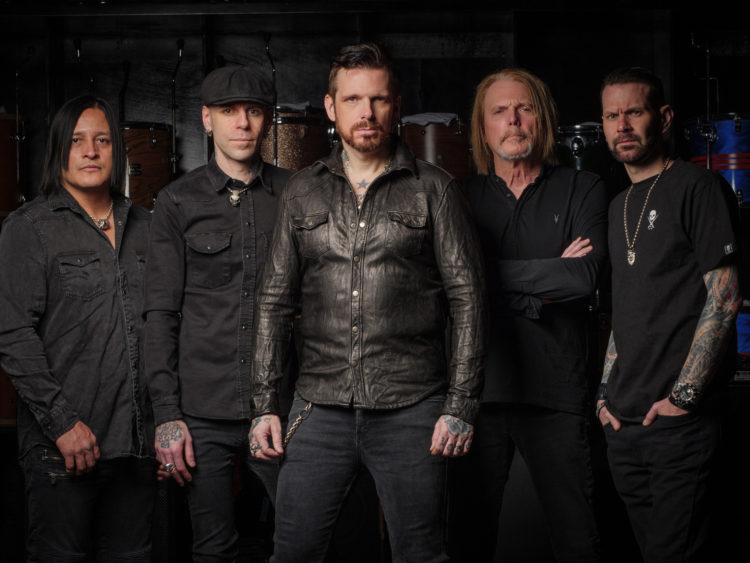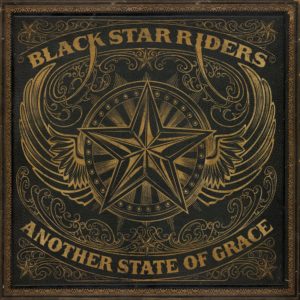
Although not as well known in North America as they are in Europe and the United Kingdom, hard rockers Black Star Riders are hoping that with the release of their fourth studio album, Another State of Grace, they will add even more fans to their burgeoning base of support, and will continue to turn heads of rock fans on this side of the Atlantic.
Many were already blown away but the British/American group’s incendiary live set opening for Judas Priest on a tour of North America last year, alongside NWOBHM icons Saxon. During those shows, the band, which features two former members of the last incarnation of Thin Lizzy, demonstrated their veteran savvy as powerhouse live performers and also as crackerjack songwriters with their repertoire of riff-roaring, melodic hard rock music.
Co-founder and lead guitarist Scott Gorham said he is thrilled with the critical and popular acclaim being generated by the new album and believes that part of reason why Another State of Grace is doing so well is because there’s a new energy in the band, thanks to some recent lineup changes.
“Everybody is saying, 100 per cent that this is the best album that we have done. We kind of thought that, even going in and when we were listening and feeling out the songs that were being written and how we were going about it that something special was happening. And, to be quite honest, when we heard the mini-mixes in the studio when you finish tracking the song, we listened to it and went, ‘wow, okay that’s a step up from the last three albums.’ The reaction we have been getting is pretty incredible, and I know everybody says that about every new release, but it really feels like this is the one, the best album to date,” said Gorham, from his home near London, where he has been living since 1974 – without losing a hint of his American accent.
“There are three of us in the band who have been together for quite some time but just recently we had a couple of personnel changes. Jimmy DeGrasso on drums felt that he had to leave for family reasons and all that, and that’s when Chad Szeliga [Breaking Benjamin, Black Label Society] came in and he’s a different kind of drummer. There’s a different feel to him, a different attitude behind the kit. And with guitarist [and band co-founder Damon Johnson], he left for the same reason. We spend so much time in Europe, and these guys have to fly in from America, and they’ve got kids. So, Damon said to me, ‘I’ve got to go, I am missing my kids growing up.’ Well, that’s pretty much okay with me. Being in a band, it’s not like having a jail sentence. If you’ve got to go, you’ve got to go.
 “And soon after Christian Martucci [Stone Sour] sent in a video that he had done of him playing all the previous Black Star Riders songs. And we watched this and thought he was good, with the sounds and the technique and we could tell with his personality he might be a good fit. I talked to him over the phone, invited him to come jam with us and he fit in right away. It’s like there’s new blood coming into the band and everybody feels like this is an important album. Now we’ve got to re-prove ourselves. Nearly half the band is brand new, we’ve got to show everybody that we picked the right people, that we’re good decision makers. And we even changed producer from Nick Raskulinecz [Rush, Foo Fighters, korn] with Jay Ruston, who had mixed the last couple of albums but wanted to sit in the general’s chair for the next one. We felt we needed to make a more important album, we needed an upgrade, and we think that’s what we have done. And I hope people continue to feel that with this album.”
“And soon after Christian Martucci [Stone Sour] sent in a video that he had done of him playing all the previous Black Star Riders songs. And we watched this and thought he was good, with the sounds and the technique and we could tell with his personality he might be a good fit. I talked to him over the phone, invited him to come jam with us and he fit in right away. It’s like there’s new blood coming into the band and everybody feels like this is an important album. Now we’ve got to re-prove ourselves. Nearly half the band is brand new, we’ve got to show everybody that we picked the right people, that we’re good decision makers. And we even changed producer from Nick Raskulinecz [Rush, Foo Fighters, korn] with Jay Ruston, who had mixed the last couple of albums but wanted to sit in the general’s chair for the next one. We felt we needed to make a more important album, we needed an upgrade, and we think that’s what we have done. And I hope people continue to feel that with this album.”
Another State of Grace is the band’s fourth studio album in less than seven years. Formed in 2012, the original lineup was actually the then current lineup for classic rock legends Thin Lizzy, headed up by Gorham, who had been with Lizzy since 1973. That lineup wanted to record new music, but out of respect for the Lizzy legacy, particularly that of founder, the late great Phil Lynott, they chose to create in essence a new band, that would carry forward some of the musical vibe and style that Lizzy was known for.
Alongside Gorham in 2012 was vocalist Ricky Warwick, the aforementioned Johnson and DeGrasso, as well as original bassist Marco Mendoza {Whitesnake, The Dead Daisies] who departed in 2014 to be replaced by long-time Gorham pal Robbie Crane.
Since the release of the band’s debut album All Hell Breaks Loose in 2013, albums have come at regular two-year intervals, a rarity in the music business these days. Part of the reason for the rapidity of releases was the fact there was a lot of creative energy coming forth from band members. Another reason for building their own Black Star Riders repertoire was so that they didn’t have to rely as much on Thin Lizzy material in their sets, creating more space between the two entities.
“Obviously, this band has come out of, for lack of a better term, the ashes of Thin Lizzy. And when we decided to go with the name Black Star Riders, we decided all our focus is on this. But the problem is, when you go out on the road, you’ve only got one album’s worth of original songs in the beginning. So, we have to keep throwing in the Thin Lizzy material which, you know, nobody was bothered with. We all love Thin Lizzy, I spent most of my life doing and talking about Thin Lizzy,” Gorham said.
“Again, you get to the second album [The Killer Instinct, released in 2015] and you still don’t have enough material to do a headlining set. So, it was only until the last album, [2017’s Heavy Fire] that we really pared down the whole Thin Lizzy thing and were able to really stand on our own two legs with primarily doing Black Star Riders songs. For certain shows and tours, like the one we did last year with Judas Priest, we did a couple of Lizzy songs, like Boys Are Back in Town, and Whisky in the Jar.
“North America is a dilemma because we’re not going to be a well-known band, but right now we absolutely have enough material to just flat out do all Black Star Riders the whole way. But do we do that and not tour much because we’re not known like we are over here in Europe and the U.K., so we think we might leave in one Thin Lizzy song to show people where this thing came from. But it’s a tough call.”
 The heritage of Thin Lizzy still shines through on some Black Star Riders songs, particularly the Irish/Celtic influence that infused many of Lynott’s compositions. Warwick grew up in County Down, Northern Ireland idolizing Thin Lizzy, and over his years singing for that band, he as well as his many years on the Irish scene in bands such as The Almighty, Irish themes and tones were bound to emerge in any music he had a hand in writing.
The heritage of Thin Lizzy still shines through on some Black Star Riders songs, particularly the Irish/Celtic influence that infused many of Lynott’s compositions. Warwick grew up in County Down, Northern Ireland idolizing Thin Lizzy, and over his years singing for that band, he as well as his many years on the Irish scene in bands such as The Almighty, Irish themes and tones were bound to emerge in any music he had a hand in writing.
“Rickey was born in Belfast and with myself, I spent so much of my career with Thin Lizzy, so something of the Irish DNA is bound to come through as it runs pretty deep. And Ricky and I both love the whole rhythmic way the Irish present their music. It’s just so cool. You can’t stand still when you hear those Irish songs, it kind of does something to you, and it’s a natural thing that comes out in the music. Usually, he will write one really Irish sounding song for an album and I will write one, and then sometimes we come together on one. It’s natural, but it’s something we don’t want to overdo. There’s always going to be nods towards Ireland on every album. It’s just paying our respects to where we came from,” said Gorham, adding that while he and Warwick do the bulk of the writing, everyone gets involved at some point in the process, and even incorporated novel ways to get Martucci involved although he was on the road with Stone Sour.
“We got to L.A. about 10 days early just so we could sit in the room with Jay and work out chord patterns and arrangements. But Christian wasn’t there at the time, he was out touring with Stone Sour. But he had a suggestion, something we had never tried before. He said, ‘why don’t each of put your ideas down on an iPhone or iPad or whatever, no matter how long or short and email them over to me. And while I am on tour, I am going to have my ProTools with me, and I can start gluing all these different parts together in song form and add to them.’ I was a little hesitant. I am pretty old school, I like being in the room together, eyeball to eyeball, shoulder to shoulder. But I decided to give it a shot. What the hell, we’ve got nothing to lose by trying it. I turned over about 20 ideas, Ricky sent over probably 25, Robbie the bass player even sent over a few and then Christian threw his ideas into the mix.
“And that’s what he would do. He sat in the back of the Stone Sour bus or in his hotel room, studiously trying to glue all these things together, and then send them back to us. And for the most part it was pretty cool. Obviously not everything worked, but we could wait until he got back for rehearsals to fix them. In the end, I think we’re all really pleased at how it got worked out and how much time it saved and how much it actually kind of drew us together as people, especially the new guys. It was kind of trial by fire for Christian – let’s see what the guy can do. And from the first stuff he sent back, Ricky and I were like, ‘okay, keep going.’ This all cut the fat so we could actually walk into the studio knowing that there were 15 solid ideas already to work on.”
As the two main creative spirits in the band, and long-time bandmates, Gorham said the working relationship and friendship between he and Warwick is solid and egoless.
“We really respect each other for what we do and what we have done in the past. We know that we can rely on each other. Nobody is going to f*** anyone over. I am not going to not show up. There is a trust thing there that I think is really important in bands. You’ve got to be able to trust each other because you are travelling around the world. You are playing in front of thousands of people every night, you’ve got to be able trust that guy on your left and on your right,” he said.
“We’re also just great friends. We’ve got the same sense of humour. We sit in the back of the bus on the long tours and just talk bullshit and laugh. A great sense of humour is a must in a rock band. You’ve got to have that sense of humour and you’ve got to have a think skin at the same time.”
Besides the unique Irish tinge to the music, there is also a sense of the political and social nature of much of the Irish rock music of the 20th and 21st century in some of the more compelling and evocative lyrics penned by Warwick on songs such as Soldier in the Ghetto, In the Line of Fire, Why Do You Love Your Guns and Shadow of the War Machine.
 “I don’t think we consider ourselves a political band. There was a saying in Thin Lizzy that our job was to make sure that everybody had a great time, and we’re not trying to shove anything down your throat. This is what we think, but you don’t have to think the same way. With Why Do You Love Your Guns, Ricky and I have sat several times in the back of the tour bus watching the news about another mass murder in America. And then you see these people coming out and defending that god damned Second Amendment in the Constitution that guarantees, in their minds, that they are able to carry their guns anywhere they want to,” Gorham said.
“I don’t think we consider ourselves a political band. There was a saying in Thin Lizzy that our job was to make sure that everybody had a great time, and we’re not trying to shove anything down your throat. This is what we think, but you don’t have to think the same way. With Why Do You Love Your Guns, Ricky and I have sat several times in the back of the tour bus watching the news about another mass murder in America. And then you see these people coming out and defending that god damned Second Amendment in the Constitution that guarantees, in their minds, that they are able to carry their guns anywhere they want to,” Gorham said.
“Here’s the thing, I used to get people call me from America when I came to England in the 1970s, when the whole IRA thing was going on, and they were asking how I could live in England with all these bombs going off. It was a real theme for them. And I had to remind them that it took the IRA 20 years to kill 2,000 people. In America, that happens every single month like clockwork. Ricky’s got kids and everyone else in the band has got kids and they are dropping their kids off at school, and some are going through metal detectors and damned near barbed wire at the top of the fence. Its like you are dropping them off at prison rather than a school. Somebody’s got to say something about this at some point, and Ricky really had to get this out of his system. And I was right there with him. I totally believe in what he is saying in this song and all the others.
“Remember, like I was saying before. He grew up in the whole 1970s IRA era, The Troubles, and that is kind of part of his makeup. That’s how he grew up, seeing bombed out buildings, hearing it on the news every day that bad things are happening just a couple of miles down the road from where he lived. At some point as a songwriter and an artist, you are going to bring out that darker side. You are going to want to bring this out and let people know ‘this is how I grew up.’ And maybe somewhere, some guy in the Middle East will hear this song and he will get a benefit out of it and it may make him feel a little better knowing he is not alone in the world. Like I said, we’re not a political band, it’s just that every once in a while, you have to say what you believe in. Ricky has told me several times that he can’t sing a lyric that he does not believe in.”
With the release of Another State of Grace, the Black Star Riders are hitting the road for an extensive tour of the United Kingdom in October before traversing the rest of Europe for the following seven weeks. Gorham said he is hoping to hear about a return to North America for 2020.
For more information on the band, tour dates and new album, visit www.blackstarriders.com.
- Jim Barber is a veteran award-winning journalist and author based in Napanee, ON, who has been writing about music and musicians for a quarter of a century. Besides his journalistic endeavours, he now works as a communications and marketing specialist. Contact him at jimbarberwritingservices@gmail.com.
SHARE THIS POST:
